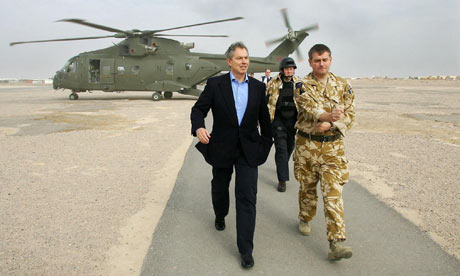
Tony Blair admits that Britain and the US failed to anticipate, after the invasion of Iraq, "the nightmare that unfolded" as al-Qaida and Iran destabilised the country after the overthrow of Saddam Hussein in 2003.
In an emotional chapter in his memoirs on the Iraq war, in which he admits to shedding many tears at the loss of so many lives, the former prime minister insists that military action was justified and refuses to offer an apology for joining forces with George Bush.
"I can't regret the decision to go to war," he writes in A Journey. But he adds: "I can say that never did I guess the nightmare that unfolded, and that too is part of the responsibility. The truth is we did not anticipate the role of al-Qaida or Iran. Whether we should have is another matter; and if we had anticipated, what we would have done about it is another matter again."
Blair writes of his anguish about how families of the fallen may not understand his pain at the loss of so many lives. "Do they really suppose I don't care, don't feel, don't regret with every fibre of my being the loss of those who died," Blair writes as he pays tributes to coalition soldiers and Iraqis who lost their lives.
"The anguish arises from a sense of sadness that goes beyond conventional description or the stab of compassion you feel on hearing tragic news," he adds. "Tears, though there have been many, do not encompass it. I feel desperately sorry for them, sorry for the lives cut short, sorry for the families whose bereavement is made worse by the controversy over why their loved ones died, sorry for the utterly unfair selection that the loss should be theirs."
But despite such remarks, Blair says he cannot apologise for invading Iraq because he says that Saddam still had the intent to develop a weapons of mass destruction programme. The Iraqi leader only put his WMD programme "into abeyance" for short-term tactical reasons to end UN sanctions, Blair argues. "I can't say sorry in words; I can only hope to redeem something from the tragedy of death, in the actions of a life, my life, that continues still," he writes.
He highlights his continuing anguish over Iraq in an emotional account of the final moments of his appearance before the Chilcot inquiry in January this year. He writes of his anger when Sir John Chilcot concluded the session by asking: "Do you have any regrets?"
Blair writes: "It was a headline question. It had to have a headline answer. Answer 'yes' and I knew the outcome: 'Blair apologises for war', 'at last he says sorry'. Choose a variant. The impact would be the same.
"Those who had opposed the war would rejoice; those who had supported it would be dismayed, imagining their support and in some cases their sacrifice had been in vain. Answer 'no' and you seem like some callous brute, indifferent to the suffering or perhaps worse, stubbornly resistant, not because of strength but because you know nothing else to do."
Blair recounts how he told the inquiry that he took responsibility, an answer that he admits was incomplete. "The anger was at being put in a position in an inquiry that was supposed to be about lessons learned, but had inevitably turned into a trial of judgment, and even good faith; and in front of some of the families of the fallen, to whom I wanted to reach out, but I knew if I did so, the embrace would be immediately misused and misconstrued. But the anger was selfish, trivial – comparatively at any rate – and transient."
He writes of how he feels that offering words of condolence and sympathy are inadequate. "They have died and I, the decision maker in the circumstances that led to their deaths, still live."
Blair admits that the intelligence that Saddam possessed a WMD programme "turned out to be incorrect".
Despite admitting this error, he says the invasion was still the correct course of action by citing a 2004 report by the weapons inspector Charles Duelfer. This included interviews with senior figures in Saddam's regime and an interview with the ex-Iraqi president conducted by an FBI agent, George Piro. The report uncovered tapes of meetings between Saddam and senior staff at which the WMD programme was discussed. Blair writes that Saddam made a "tactical decision to put such a programme into abeyance, not a strategic decision to abandon it".

